At Home in the Dark Read online
Page 28
• • •
That evening, I found Detective Reed waiting at my doorstep of the parish house. He gave me his sardonic smile. “Evening, Father Byrne. I’m here to offer you an apology.”
“I don’t believe we have anything further to discuss.”
“I’m sorry our conversation yesterday upset you so much that you ran to your bishop,” he said.
“I hope you might reflect on what you said to me. Your efforts should be concentrated on finding Frank.”
“I have been reflecting, Father. More than you can imagine.”
His words were mild, but there was an undercurrent of a threat in them, lurking like a worm in an apple.
“Well, then, I hope that you’ll reconsider your animus toward the Church,” I said.
“My animus is towards people who abuse positions of trust,” Reed said. “I’ll be honest with you. I was abused by a priest when I was an altar boy. It was an awful secret I kept from my family for years. I felt that if I said a word, God would strike me down. Doesn’t that sound crazy, Father? The victim of the crime is made to feel like the guilty one.”
His words stopped me short. “I am truly sorry that happened to you. I know the Church used to sweep crimes under the carpet. That was a tragedy.”
“Since I’m off the case now, it doesn’t really matter,” he said. “My lieutenant worried that my experience biased my thinking. He’s probably right. This isn’t a child-abuse case, but I know exactly how manipulative priests can be.”
“Good night, Detective Reed.”
“Oh, I almost forgot. I brought you a present.”
I eyed him warily. “Excuse me?”
Reed handed me an unsealed white envelope. There were two sheets of paper inside. The one on top looked like a photograph of a torn sheet of hotel stationary, only the gold griffin at the top of the page was severed in two. I could make out Abby’s handwriting clearly. Reasons I Will Never Go Back to Frank, it read:
He made my life hell
He is crazy and violent
My mother has always hated him
He has a gambling addiction
He drinks too much
I don’t love him anymore
“Hold on,” Reed said, pulling that page out of my hands and gingerly folding it into thirds. “That wasn’t supposed to be in there. The other page is for you.” He took the envelope from me and replaced the note.
“That was a note Abby wrote,” I said. “I recognize her handwriting.”
“Yes, we found it in her suite. The bottom of the page was torn off.”
I remembered exactly what Abby had written. The last line of that list was Because I love you. I tamped the memory down. The police would never find that slip of paper; it was already ash.
“Abby Killingsworth didn’t have many paper books, but she had an electronic reader,” Reed added. “That page you’re holding has a list of the books she downloaded in the past six months.”
I glanced at it, and my eye fell on a book entitled Dilemma. I couldn’t help it; I flinched.
“She bought Father Cutié’s book,” Reed said quietly. “Isn’t that interesting?”
Father Cutié was a cautionary tale in the priesthood. A rising star in the Church, he was photographed embracing a woman on a beach in Miami; he abandoned the Church for that woman, and married her. Dilemma bore the subtitle, A Priest’s Struggle With Faith and Love, and it was popular, especially among those who believed that the Church needed reform. He had since become an Episcopalian priest, and a powerful advocate for allowing Catholic priests to marry.
As I stared at the page, I could hear Abby’s voice in the back of my mind. You could become an Anglican priest, Michael, she had told me. You would still have a parish. Think how wonderful it would be. She had been such a little fool. She refused to understand that serving an audience of dull, careless Protestants had little allure next to the might and glamour of Rome. It wasn’t even a consolation prize; after everything I’d sacrificed in my life, it would be a crushing failure. I had failed to live up to my vows a mere handful of times; I wasn’t going to depart from the Church because of a rare misstep I’d made.
“Here’s what I’m sure of,” Reed said. “You weren’t just Abby’s priest. You ministered to her in other ways. Hell, you might even be the father of her child, Father.” He leered at me. “Wouldn’t that be a kick in the head? How about a DNA sample to prove me wrong?”
“I’m not going to listen to this nonsense,” I said, but I felt faint. There was a pounding behind my eyes that wouldn’t die down.
“I also know that it’s not a coincidence that Frank DeSilva went to see you, then killed Abby that same day. What did you say to him that set him off, Father Byrne?”
I didn’t answer him, stepping toward the front door, key in hand.
“Here’s what I can’t quite put together,” Reed said. “If you told Frank DeSilva you were sleeping with his wife, he probably would’ve killed you. What did you say?”
“I’m not responsible for what Frank did,” I said. “He made his own choices. If you were any sort of proper detective, you’d find him, instead of harassing me.” I went into the parish house and locked the door. Reed finally walked away, but the pounding in my head remained.
• • •
I couldn’t sleep that night. There was an echo of Abby’s voice still in my head. I have wonderful news, Michael, she had told me. Don’t be upset. I’m pregnant.
The news had run through my body like an electric current, paralyzing me, rooting me to the spot. It was as if the doors of paradise had suddenly swung closed in my face. I was a man, subject to weakness as any man might be, only the punishment for any transgression was so much worse.
All I’d been able to say to Abby in return had been, Then you’ll have to go back to Frank. The look she gave me then was seared on my brain. It was a mix of fury and contempt.
I’ll never go back to Frank, she insisted. Never.
Make a list of pros and cons, I had told her. Truly think about it. Write it down. I had handed her one of those notepads they left by the bedside in hotels, along with the ballpoint pen with the name of The Griffin embossed in silver on the side. One page for reasons to leave Frank, one page for reasons to stay.
This is ridiculous, Abby protested.
Try it, I insisted. See what happens.
No matter which way I tossed and turned, I couldn’t find any peace. Finally, I gave up, getting out of bed while it was still dark out and reviewing the remarks I was going to make at Abby’s funeral that day. I’d always been an early riser, but it was a habit the priesthood had enhanced and reinforced; you simply didn’t rise in the Church if you had trouble getting up in the morning. There were all manner of difficulties one could have, but not that one. I had some tea and took a long, solitary walk around the neighborhood and to the park, determined to clear my mind. None of it really helped. No matter what I did, there was a heaviness in my chest when I thought of Abby.
Her funeral mass was at ten that morning. I arrived at the church at eight-thirty. Abby’s parents walked in just before nine; Janet was ghostly pale, while Stewart’s face was red. I embraced them each in turn, murmuring words of comfort.
“You’ll say the Absolution?” Janet whispered to me, while her husband wandered up to his daughter’s coffin. The polished mahogany box was closed. Flowers lined its surface and greenery cascaded down the sides, as if it were a garden in bloom.
“Of course,” I promised her.
Waves of mourners flowed into the church as somber organ music played. The Killingsworths were a popular family, wealthy and attractive, the sort of people one never imagined tragedy befalling. There were friends and supporters who loved them, and loved Abby, but there were also vultures there to witness their sorrow. I noticed a lone police officer looking vaguely out of place in the sanctuary; presumably, he was there in case Frank made an appearance.
Just before the service was to begin, I n
oticed that Janet wasn’t in the front pew. Her husband was slumped there, head bowed.
“Where’s Janet?” I whispered to him.
Stewart barely lifted his head. “She went out for a smoke.”
There was a small side door that led to the church offices, as well as a small, private garden. It was as far as one could get from the mourners, and I imagined that was where Janet had gone for privacy. I headed that way, the din of voices and organ music behind me. It was only when I opened the door that I saw there were two people in the garden. Frank was holding a knife against Janet’s throat.
“You drove us apart!” Frank seethed.
They both turned to stare at me.
“Frank, my son,” I said. “Please, put down that knife.”
“She hated me, Father,” Frank gulped. “You know she did. You saw the list.”
Abby’s list of reasons not to go back to him, he meant. Sandwiched between, He is crazy and violent and He has a gambling addiction, were the words, in Abby’s loopy handwriting, My mother has always hated him.
“Frank, give me the knife,” I pleaded. “You’re a child of God, no matter what you’ve done. Let go of Janet.”
“She broke us up,” Frank was weeping now. “She made Abby leave me.”
“You hurt Abby,” I said, as gently as I could. “That’s why she left, Frank. Not because of her mother. Because of what happened between the two of you.”
“I love her,” Frank wept brokenly. “I really did. I didn’t mean to hurt her . . .”
“Then let go of her mother,” I insisted. “Let me help you, Frank. Give me the knife.”
He shoved Janet away, and I caught her, but he held fast to the knife. Once I made sure Janet was steady, I asked her to step back and turned my attention to Frank.
“Give me the knife,” I said. “We don’t want anyone else getting hurt.”
“Abby was everything to me,” Frank whispered. “I didn’t mean to kill her. After you told me she was pregnant . . .”
“I know, Frank, I know,” I said softly. “You’ll be reunited with her one day, I promise you.”
“But . . . she’s dead.”
“She’s moved into the next life,” I whispered. “One day, so will you.”
“But I’ll go to hell, Father,” Frank whispered back.
“There is no hell, except the one we make for ourselves. Now give me that knife. I’m afraid you’ll use it to see Abby right now.”
Frank gazed at me like a child in wonderment, fully understanding what I meant. He held the tip of the blade against his abdomen, as if deciding how to proceed.
“Damn you,” Janet hissed, stepping forward and plunging the knife into his bowels. “Damn you to hell.”
• • •
The headlines died down within a fortnight, but I kept a few of the best in my study. My favorite was Hero Priest Saves Grieving Mother From Daughter’s Killer, which was gloriously lurid. I sent it to my mother in Cork, expecting that she would be impressed, but her note of reply only mentioned that it should be Heroic. Hero or heroic, I would take it either way. Bishop Calton may not have cared much for me, but he’d had no choice but to nominate me for the title of monsignor. Rome no longer seemed like such a distant dream.
I attended Frank DeSilva’s funeral, but no one else did. The police took no interest in his death. Janet and I both described it as a suicide, and they accepted that.
It was a surprise to have Detective Reed appear at my office at the church one morning, shortly after I arrived. He let out a low whistle at the sight of a framed cover from a local newspaper.
“My secretary insisted on doing that,” I said, feeling my face redden.
“It’s great publicity.” He turned to face me. “But I wanted to give you a heads-up that you need to brace for some bad publicity.”
“How’s that?”
“I’d always wondered how you engineered everything,” Reed said. “Abby’s murder, specifically. It wasn’t easy for me to piece it all together.”
“Frank killed Abby. You know that. I had nothing to do with it.”
“You had everything to do with it, Father,” he said. “You had an affair with Abby. Please don’t try to deny it. We know.”
“Even if that were true—and it isn’t—it has nothing to do with her death.”
“It led directly to her death. You remember this piece of paper?” Reed pulled out the photocopy of Abby’s list of reasons to leave Frank. “There are three sets of fingerprints on it. Abby’s. Frank’s. And yours.”
“That proves nothing. I was the one who suggested to Abby that she write the list. I must’ve touched the page.”
“You’re the one who gave it to Frank,” Reed said. “Because Frank had it after he left your office, when he hit the bar. The bartender remembers him mooning over it.”
“You’re suggesting I gave Frank that list. I didn’t.”
“Maybe you left it lying around your desk for him to find.” Reed shrugged. “Maybe that’s the reason you left him alone in your office. Give Frank some time to root around. How convenient that the name and address of the hotel Abby was staying in was at the top of the page.”
“I can’t believe you’re spouting such nonsense.” I tried to rise to my feet, but my legs were trembling. “You can’t prove any of this.”
“Here’s something I can prove: the day Abby died, you called Frank and asked him to come to your office. We have the voicemail you left him.”
I blinked at him silently. There was no answer for that.
“But you’re right, it would be hard to prove all this in court,” Reed said. “It’s enough for me that I know the truth.” He stepped toward to door. “And that Janet Killingsworth does too, of course.”
“What are you doing? Filling Janet’s head with lies?”
“Janet was deeply shaken by Frank’s death at Abby’s funeral. She had to be sedated for a few days. After that, we started talking. You know what she told me? Frank knew Abby was pregnant because you told him.”
I swallowed hard. “What?”
“Janet remembers it very clearly. She was so upset at the time, with her daughter’s funeral and thinking she was going to die herself, that she didn’t put it all together. After we started comparing notes, she understood what had really happened to Abby. She knows you pulled Frank’s strings. You gave him Abby’s location.”
“Frank made his own choices,” I protested, but my voice was faint.
“You keep saying that,” Reed observed. “But what I see, over and over, is you tempting others into sin, and evading consequences for it. But I don’t think you’ll be doing that much longer.”
“Detective,” I said urgently. “I have a confession to make. Frank didn’t kill himself. Janet was the one who stabbed him.”
Reed gazed at me, and his face cracked into a smile. “I know,” he said.
I stared at him in astonishment. “Aren’t you going to arrest her?”
“No, I’m not.” Reed opened the door. “But I’d start making things right with my Maker, if I were you. I’d hate to guess how long you have to do it.”
Faun
Joe Hill
PART ONE: OUR SIDE OF THE DOOR
Fallows Gets His Cat
The first time Stockton spoke of the little door, Fallows was under a baobab tree, waiting on a lion.
“After this, if you’re still looking for something to get your pulse going, give Mr. Charn a call. Edwin Charn in Maine. He’ll show you the little door.” Stockton sipped whiskey and laughed softly. “Bring your checkbook.”
The baobab was old, nearly the size of a cottage, and had dry rot. The whole western face of the trunk was cored out. Hemingway Hunts had built the blind right into the ruin of the tree itself: a khaki tent, disguised by fans of tamarind. Inside were cots and a refrigerator with cold beer in it and a good wifi signal.
Stockton’s son, Peter, was asleep in one of the cots, his back to them. He’d celebrated his
high school graduation by killing a black rhinoceros, only the day before. Peter had brought along his best friend from boarding school, Christian Swift, but Christian didn’t kill anything except time, sketching the animals.
Three slaughtered chickens hung upside down from the branch of a camel thorn, ten yards from the tent. A sticky puddle of blood pooled in the dust beneath. Fallows had an especially clear view of the birds on the night-vision monitors, where they looked like a mass of grotesque, bulging fruits.
The lion was taking his time finding the scent, but then he was elderly, a grandfather. He was the oldest cat Hemingway Hunts had on hand and the healthiest. Most of the other lions had canine distemper, were woozy and feverish, fur coming out in patches, flies at the corners of their eyes. The game master denied it, said they were fine, but Fallows could tell looking at them they were going down fast.
It had been a bad luck season on the preserve all around. It wasn’t just sick lions. Only a few days before, poachers had rammed a dune buggy through the fence along the northwestern perimeter, took down a hundred feet of chain-link. They roared around, looking for rhino—the horn was worth more by weight than diamonds—but were chased out by private security without killing anything. That was the good news. The bad news was that most of the elephants and some of the giraffe had wandered off through the breach. Hunts had been cancelled, money refunded. There had been shouting matches in the lobby and red-faced men throwing suitcases into the backs of hired Land Rovers.
Fallows, though, was not sorry he had come. He had, in years before, killed his rhino, his elephant, his leopard, and buffalo. He would get the last of the big five tonight. And in the meantime there had been good company—Stockton and his boys—and better whiskey, Yamazaki when he wanted it, Laphroaig when he didn’t.

 The Fireman
The Fireman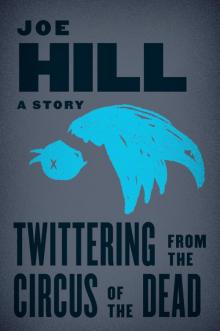 Twittering From the Circus of the Dead
Twittering From the Circus of the Dead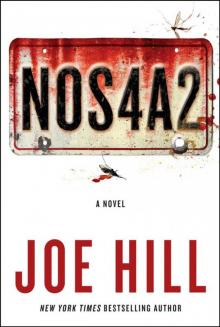 Nos4a2
Nos4a2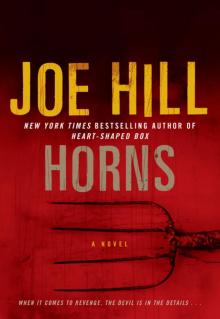 Horns
Horns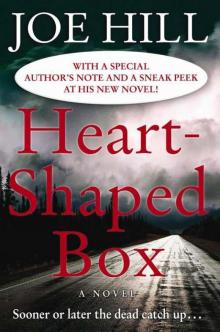 Heart-Shaped Box
Heart-Shaped Box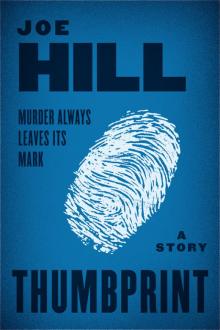 Thumbprint: A Story
Thumbprint: A Story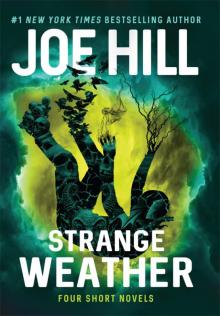 Strange Weather
Strange Weather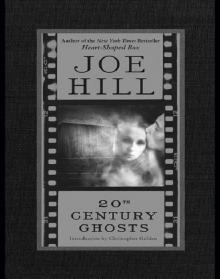 20th Century Ghosts
20th Century Ghosts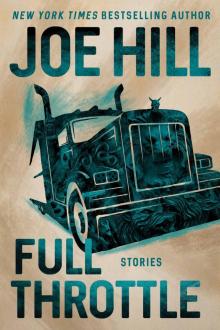 Full Throttle
Full Throttle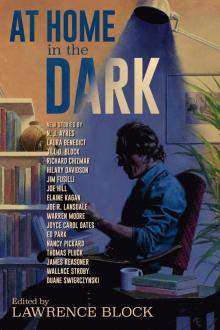 At Home in the Dark
At Home in the Dark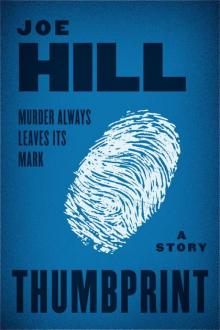 Thumbprint
Thumbprint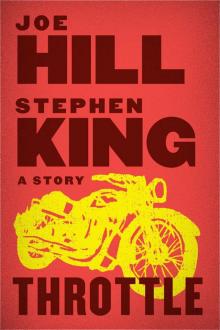 Throttle
Throttle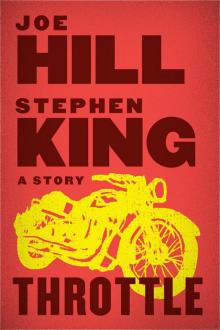 Throttle (Kindle Single)
Throttle (Kindle Single)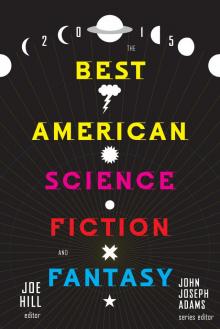 The Best American Science Fiction and Fantasy 2015
The Best American Science Fiction and Fantasy 2015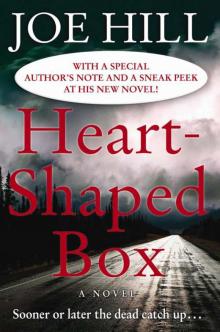 Heart-Shaped Box with Bonus Material
Heart-Shaped Box with Bonus Material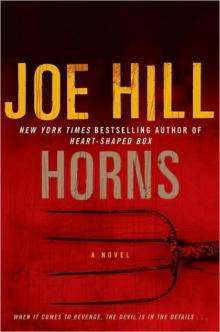 Horns: A Novel
Horns: A Novel